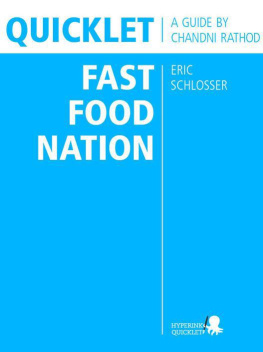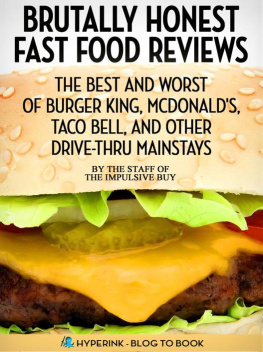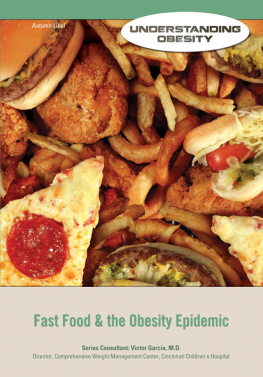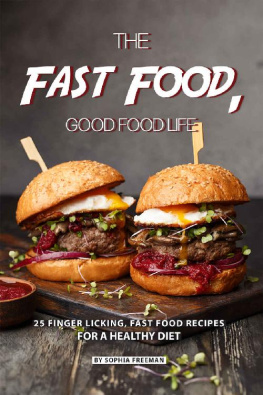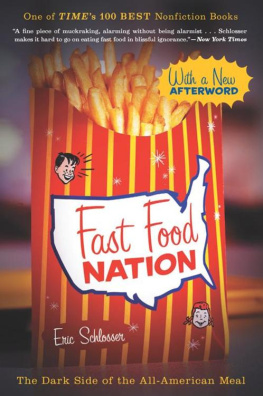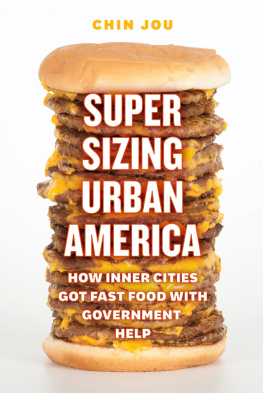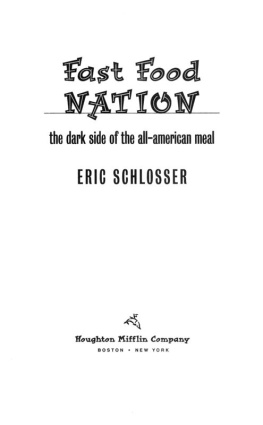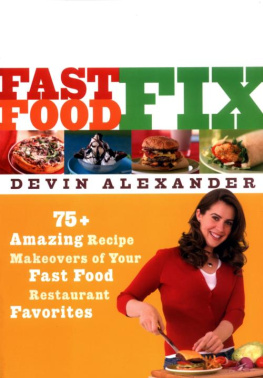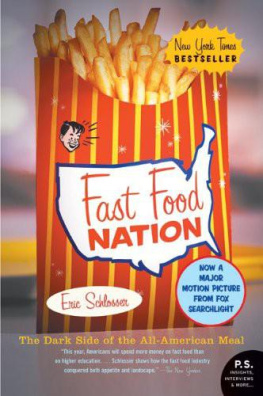Chandni Rathod - Quicklet on Eric Schlossers Fast Food Nation
Here you can read online Chandni Rathod - Quicklet on Eric Schlossers Fast Food Nation full text of the book (entire story) in english for free. Download pdf and epub, get meaning, cover and reviews about this ebook. year: 2012, publisher: Hyperink, genre: Children. Description of the work, (preface) as well as reviews are available. Best literature library LitArk.com created for fans of good reading and offers a wide selection of genres:
Romance novel
Science fiction
Adventure
Detective
Science
History
Home and family
Prose
Art
Politics
Computer
Non-fiction
Religion
Business
Children
Humor
Choose a favorite category and find really read worthwhile books. Enjoy immersion in the world of imagination, feel the emotions of the characters or learn something new for yourself, make an fascinating discovery.
- Book:Quicklet on Eric Schlossers Fast Food Nation
- Author:
- Publisher:Hyperink
- Genre:
- Year:2012
- Rating:5 / 5
- Favourites:Add to favourites
- Your mark:
Quicklet on Eric Schlossers Fast Food Nation: summary, description and annotation
We offer to read an annotation, description, summary or preface (depends on what the author of the book "Quicklet on Eric Schlossers Fast Food Nation" wrote himself). If you haven't found the necessary information about the book — write in the comments, we will try to find it.
ABOUT THE BOOK
Hundreds of millions of people buy fast food every day without giving it much thought, unaware of the subtle and not so subtle ramifications of their purchases. They rarely consider where this food came from, how it was made, what it is doing to the community around them. They just grab their tray off the counter, find a table, take a seat, unwrap the paper, and dig in. The whole experience is transitory and soon forgotten. Ive written this book out of a belief that people should know what lies behind the shiny, happy surface of every fast food transaction. They should know what really lurks between those sesame-seed buns.Published in 2001, Eric Schlossers Fast Food Nation: The Dark Side of the All-American Meal explores the dark underbelly of fast food production in the United States. An award-winning journalist and contributor to Atlantic Monthly, Schlosser developed the book from a series of articles for Rolling Stone magazine. Rolling Stone asked Schlosser to find out where fast food came from. As someone who enjoyed indulging in fries and hamburgers, Schlosser was initially reluctant to take on the assignment.As he began to research the history and formation of the fast food industry, he became increasingly curious about how the industry gained power and influence on Americas agricultural landscape and food culture. With over 50 pages of research notes included at the end of the book, the author defends his points with thorough analysis from various legal investigations, interviews, and journal articles. Schlosser artfully weaves sarcasm with gritty investigative journalism to demonstrate how corporations and greed have corrupted the food system in America.Schlossers book was a New York Times bestseller for over two years and has sold over 1.4 million print copies. In 2006, Fast Food Nation became a fictionalized film directed by Richard Linklater, which was featured at the Cannes Film Festival.However, the book and film were not met without criticism from trade industry producers of beef, potatoes, and restaurant chains like McDonalds. The Wall Street Journal reported in 2006 that various organizations were trying to create campaigns against Schlossers allegations in the book that fast food consumption contributes to obesity and fostered corruption in the nations agricultural system.
EXCERPT FROM THE BOOK
The author playfully muses that, should America be attacked in the future, Cheyenne Mountain may be the only place with artifacts of our civilizationBurger King wrappers, hardened crusts of Cheesy Bread, Barbeque Wings bones, and the red, white, and blue of a Dominos pizza box.What started as a small food stand in southern California has now spread all over the nation. Schlosser says fast food has infiltrated every nook and cranny of American society. Shockingly, Americans spend more today on fast food than higher education, computers, or new cars. Schlosser estimates, On any given day in the United States about one-quarter of the countrys adult population visits a fast food restaurant.The author argues that the powerful rise of fast food industry happened quickly and not only transformed the American diet, but also out landscape, economy, workforce, and popular culture.Importantly, Schlosser draws parallels between Cheyenne Mountain and todays fast food industry.
Chandni Rathod: author's other books
Who wrote Quicklet on Eric Schlossers Fast Food Nation? Find out the surname, the name of the author of the book and a list of all author's works by series.

